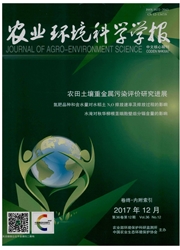

 中文摘要:
中文摘要:
国内首次应用聚甲醛固相萃取(POM-SPE)方法研究了在农田土壤中秸秆焚烧对土壤吸附多氯联苯的影响。结果表明,与传统方法相比,该方法避免了多氯联苯较低的水溶性给直接测定土-水分配系数所带来的困难,是研究疏水有机物在土-水体系中吸附行为的较理想方法。研究还表明,土壤对多氯联苯的吸附能力随着土壤中灰分的增加而增加,各种同系物的土-水分配系数受灰分的影响程度不同.氯化程度低的同系物分配系数受影响程度大于氯化程度高的同系物,并且在灰分含量0.1%以下,分配系数对数值的变化率与土壤中灰分含量之间表现出较好的线性关系(r^2〉0.85)。稻草和麦草两种灰分对多氯联苯在土-水中的吸附影响未表现出明显的差异(P〉0.05)。
 英文摘要:
英文摘要:
Effects of agricultural soils, modified with rice ash and with wheat ash, on adsorption of PCBs were measured using POM-SPE method. The results showed that this method was valid and circumvented the determination difficulty because of the extremely low aqueous concentrations of PCBs, compared with other methods. The results also showed that sorption capacity of soil to PCBs was enhanced with ash content increasing in soil, either rice ash or wheat ash. The effects of modified soil on adsorption of PCBs congeners varied, and sorption capacities to light congeners were enhanced more greatly than that to heavy congeners. Increasing ratios of logarithmic values of modified soilwater distribution coefficients were in proportion to ash contents below 0.1% in soil (r^2〉0.85). No significant different effect between rice ash and wheat ash on adsorption of PCBs in modified soils was observed (P〉0.05).
 同期刊论文项目
同期刊论文项目
 同项目期刊论文
同项目期刊论文
 Phenanthrene adsorption by soils treated with humic substances under different pH and temperature co
Phenanthrene adsorption by soils treated with humic substances under different pH and temperature co Degradation of benzo[a]pyrene in an experimentally contaminated paddy soil by vetiver grass (Vetiver
Degradation of benzo[a]pyrene in an experimentally contaminated paddy soil by vetiver grass (Vetiver Copper uptake by four Elsholtzia ecotypes supplied with varying levels of copper in solution culture
Copper uptake by four Elsholtzia ecotypes supplied with varying levels of copper in solution culture Effect of copper-tolerant rhizosphere bacteria on mobility of copper in soil and copper accumulation
Effect of copper-tolerant rhizosphere bacteria on mobility of copper in soil and copper accumulation Distribution patterns of polychlorinated biphenyls in soils collected from Zhejiang province,east Ch
Distribution patterns of polychlorinated biphenyls in soils collected from Zhejiang province,east Ch Occurrence and congeners specific of polychlorinated biphenyls in agricultural soils from Southern J
Occurrence and congeners specific of polychlorinated biphenyls in agricultural soils from Southern J Distribution patterns of polycyclic aromatic hydrocarbons among different organic carbon fractions o
Distribution patterns of polycyclic aromatic hydrocarbons among different organic carbon fractions o Bioremediation of polycyclic aromatic hydrocarbons contaminated soil with Monilinia sp.: degradation
Bioremediation of polycyclic aromatic hydrocarbons contaminated soil with Monilinia sp.: degradation Determination of Ethylenediaminedisuccinic acid in Soils and plants using reversed phase High perfor
Determination of Ethylenediaminedisuccinic acid in Soils and plants using reversed phase High perfor Residues of DDTs and their spatial distribution characteristics in soils from the Yangtze River Delt
Residues of DDTs and their spatial distribution characteristics in soils from the Yangtze River Delt Distribution of polycyclic aromatic hydrocarbons in particle-size separates and density fractions of
Distribution of polycyclic aromatic hydrocarbons in particle-size separates and density fractions of Potential role of polycyclic aromatic hydrocarbons(PAHs) oxidation by fungal laccase in the remediat
Potential role of polycyclic aromatic hydrocarbons(PAHs) oxidation by fungal laccase in the remediat 期刊信息
期刊信息
